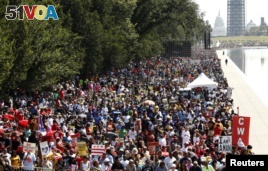Fifty years ago today, over 250,000 people, most of them of African-American descent, but including some 60,000 white activists, gathered at the National Mall in Washington, D.C. in one of the largest political rallies for human rights in United States history. Named by organizers the March on Washington for Jobs and Freedom, it was a non-violent demonstration for civil and economic rights for African Americans.

Marchers gather along the reflecting pool on the National Mall during the 50th anniversary of the 1963 March on Washington. (Aug. 24, 2013)
On August 28, 1963, having marched peacefully along the Mall, the demonstrators gathered, calm and dignified, before the Lincoln Memorial where prominent civil rights leaders addressed the crowd. The last speaker to address the crowd was Dr. Martin Luther King, Jr., a 34-year-old preacher and civil rights activist from Atlanta, Georgia, who delivered a masterpiece of rhetoric, now considered to be one of the greatest orations of all time: his I have A Dream speech.
In it, Dr. King laid out his vision of a society in which race was not an issue, where all people were treated with respect and allowed to live their lives as they see fit, regardless of their race:
“I still have a dream. It is a dream deeply rooted in the American dream.
I have a dream that one day this nation will rise up and live out the true meaning of its creed. We hold these truths to be self-evident that all men are created equal.”
Dr. King’s words that day signaled a turning point in American history. The March on Washington was an important part of the Civil Rights Movement and marked the culmination of a movement that helped to turn Dr. King’s dream into law. The following year, a reluctant Congress passed the Civil Rights Act of 1964, which outlaws major forms of discrimination and along the way desegregated public facilities, including schools. It was followed in 1965 by the Voting Rights Act, which prohibits discrimination in voting.
On April 4th, 1968, Dr. King died at 39 years old, by an assassin's bullet. But his greatest speech has inspired civil rights activists for the past fifty years, and will continue to do so as long as there is injustice in the world.